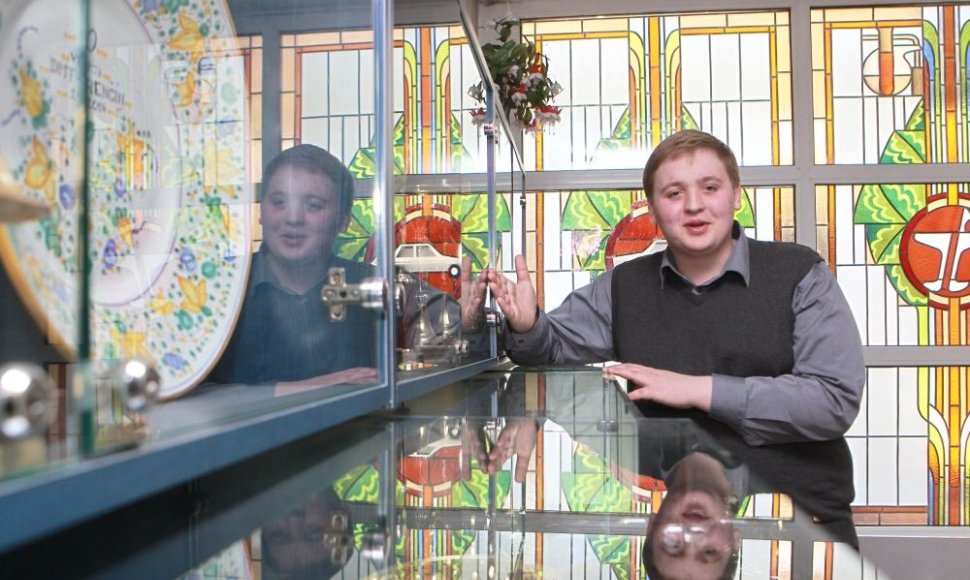Last autumn, the young Lithuanian received standing ovation from world's prominent scientists. They thus acknowledged Povilas' scientific insightfulness and ambition.
Come to think of it, it is strange that up until then, no one had thought of looking into the bacteria spread by home flies. Kavaliauskas, however, has been suspicious of them since early childhood. Spending summers at his grandparents' in the country, he would often hear that flies were dirty creatures. That it was better to stay away from them. His grandma would therefore cover food with paper or cloth so that flies could not land and walk on it.
“And so they don't bring disease,” Povilas still recalls his grandmother's words. He didn't think much of it back then. He was more interested in medication, various liquids and chemicals.
“Parents usually hide these substances from their kids for their own protection, so they don't drink it, harm themselves, etc. My parents used to guard chemicals so I don't use them up too quickly,” Kavaliauskas smiles.
Experimenting with flowers
Povilas had no taste for ordinary toys that most boys his age were crazy about. Building blocks, construction toys, toy cars would simply bore him. But prowling in storage rooms and digging into medicine chests – that was something Povilas truly enjoyed.
It was plants that made first experimental object for the five-year-old. He would dissolve various pills in water, add some shampoo, a drop of cleanser, a pinch of washing powder – and voilà, a mixture for watering mother's plants. He would then observe their reaction – would they flourish or wither and die?
“They usually died,” Povilas lowers eyes recalling his early experiments. Of course, mother would be mad, scold at him, but would soon forgive her only son for his mischiefs. Eventually, she gave up paying attention to them – took them as a given.
Back then, Povilas was too small to note his observations in a notebook or a study journal. His early experiments were just a game.
“I would pour my solution on plants and see what happened. If they didn't wither that day, that meant they would get another doze the next,” Kavaliauskas remembers.
Years went buy, but Povilas did not grow out of his scientific games. So when he was about ten, his parents gave him a microscope.
“A small one. Primitive. Amateurish,” Povilas says of his first tool. But it was enough to give his experiments a direction. Inspecting hair was one of his favourite tasks.
At fourteen, his attention was caught by flies. He remembered grandma's warnings and decided to see what diseases, after all, they carried.
Povilas would catch a fly, put it in a test tube and freeze it – so microbes would not procreate.
After assembling enough samples and formulating a hypothesis – that the insect might be a carrier of infectious diseases – he shared the insight with experienced microbiologists.
The latter were surprised at the 14-year-old's knowledge that often surpassed that of second-year students – and so the ambitious teenager was admitted into a real laboratory.
Lethal trace
Povilas, who lived in the town of Jūrė in Kazlų Rūda municipality, had to travel to Kaunas every morning, to Darius and Girėnas Gymnasium. After school, he would not rush straight home or meet friends – but instead to Lithuanian Health Science University, Microbiology Department. Povilas would spend hours inspecting flies in the lab.
“My project coordinator, Dr Rita Plančiūnienė, and I came up with a unique methodology of extracting bacteria from flies. You pour a special solution on a fly and let it rest for some time. It then mechanically decomposes, while bacteria breed in certain places,” the young scientists tries to explain his methods accessibly.
The method turned out to be effective. He discovered that even in countries of comparatively cool climate flies can carry dangerous diseases – infect people with disentery or salmonellosis.
“And, most importantly, the study has shown that they can transmit a 21-century plague – drug-resistant bacteria. The problem is especially acute in Africa, where heat allows bacteria breed very fast,” Povilas notes.
Bacteria transmitted by flies are of particular concern to oncological patients: chemotherapy leaves their bodies so weak that their immune system cannot fight even basic infections. A fly that lands on a patient's mug could therefore become a deadly killer.
Surprised by recognition
Povilas participated with his project in national selection for the EU young scientists' competition four years in a row. He was always among prizewinners, but it was only last year that he was picked to represent Lithuania internationally.
“As soon as Povilas himself and his work was ripe for it,” Jonas Karolis of Lithuanian Student Information and Technical Creativity Centre explains.
“I thought my work was nothing out of the ordinary. I expected a prize of encouragement at most. And when they said my name, I was stunned, I didn't understand what was going on. I raised my head, looked at the board – and I saw a sign saying “First Prize Winner.” Not even then could I grasp it,” Povilas says.
He was awarded a 7-thousand-euro prize for determining prevalence of antibiotics-resistant bacteria across various ecological stations in the country.
In addition to that, a trip to the International Young Scientists' Forum in Stockholm, Nobel prize award week and this year's London Young Scientists' Forum.
Even though he is now somewhat internationally acclaimed, Povilas still has things to do in Lithuania. School graduation is nearing fast. He must pass his exams well enough to be admitted to a molecular biology program in Vilnius University.
“My area is like a soft stick – you can bend it in whichever direction,” Povilas thinks. “I want to work on something that could bring tangible benefit to patients. I'm a practical mind, not theoretical.”
He plans to stay in Lithuania until at least he gets his bachelor degree. Foreign countries, meanwhile, can offer attractive internships.
“I know I'm picking a domain that does not promise results overnight. Or maybe even in several years. It requires patience and much work. But I am ready for it. I feel appreciated and that motivates you to go further.”













